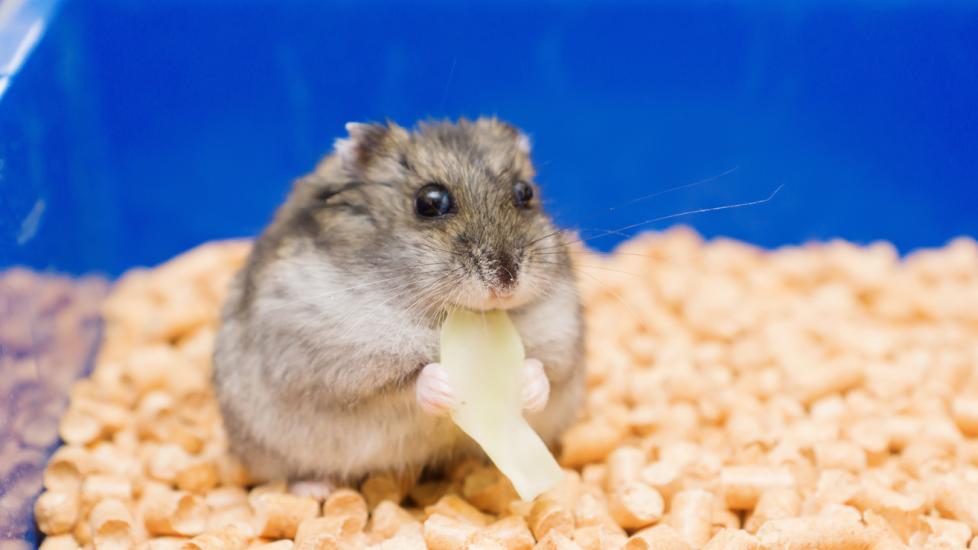Exophthalmia (Eye Bulging) in Hamsters
What is Eye Bulging in Hamsters?
Exophthalmia is a medical term for bulging eyes or eyes protruding out from their natural position. Hamsters have shallow eye sockets and well-developed orbital sinuses behind their eyes, which can make them prone to eye bulging. While it’s common for eyes to bulge, exophthalmia is generally due to an underlying condition that should be addressed immediately.
Symptoms of Exophthalmia in Hamsters
Eye bulging should be addressed by a veterinarian if you see any of the following signs:
-
Discharge/tears in the eyes
-
Crusting around the eyes
-
Trouble navigating around their enclosure (due to visual impairment)
-
Difficulty eating
-
Weight loss
-
Pawing at the face
-
Haze/color change of the eye
-
Swelling of the eye or the eye no longer being in the socket
Causes of Exophthalmia in Hamsters
Common causes of eye bulging in hamsters include:
-
Dental disease
-
Abscess behind the eye
-
Glaucoma
-
Allergies
-
Poor environmental hygiene
-
Corneal injury or injury to the surface of the eye (ulcer)
-
Trauma or inappropriate handling
How Veterinarians Diagnose Exophthalmia in Hamsters
If you notice any of the above symptoms, see a veterinarian as soon as possible. Your veterinarian will likely ask about your hamster’s eating and drinking habits, how active your hamster has been lately, and how often you clean their cage including the type of bedding you use.
Your veterinarian will examine the eye and stain the surface to look for corneal injury/ulcers. Depending on the size of your hamster, eye pressures may be evaluated, as well as an examination of the backside of the eye.
If dental disease is suspected, a sedated oral/dental examination may be performed to look for dental disease. CT scans or X-rays may also be recommended to look for abscesses or dental disease below the gum line.
Treatment of Eye Bulging in Hamsters
Eye bulging can be very painful for hamsters. Your veterinarian may prescribe pain medications, antibiotics, and topical lubrication/ointment for the eye.
If dental abnormalities are found to be the root cause of eye bulging, your veterinarian will likely perform a corrective dental procedure. In severe cases, surgical removal of the eye may be recommended. Hamsters do well and can live happy lives with one eye.
Recovery and Management of Eye Bulging in Hamsters
Follow any instructions provided by your veterinarian. Administering the necessary medications and following up with re-check appointments is imperative to helping your hamster feel better as quickly as possible.
Recovery time may be stressful for your hamster. Limit the time your hamster is out of their cage so they can rest and heal.
Eye Bulging in Hamsters FAQs
Why is my hamster's eye bulging?
Your hamster’s eye could be bulging from trauma, underlying disease, infection, and many other possibilities. It is essential to seek prompt medical care from your primary veterinarian.
How do you treat a swollen hamster eye?
Pain management is one of the first steps to treating your hamster's swollen eye. Next, the underlying cause of the eye bulge should be treated.
What can I do to help prevent hamster eye bulging?
It is best to seek routine wellness visits with your veterinarian and maintain proper care/hygiene of your hamster at all times.
References
-
Mans K. FERRETS, RABBITS, and RODENTS : Clinical Medicine and Surgery.; 2019.
-
Jörg Mayer, Donnelly TM. Clinical Veterinary Advisor. Birds and Exotic Pets. Elsevier/Saunders; 2013.
-
Suckow MA, Stevens KA, Wilson RP. The Laboratory Rabbit, Guinea Pig, Hamster, and Other Rodents. Elsevier Academic Press; 2012.
Featured Image: iStock.com/Krezofen
